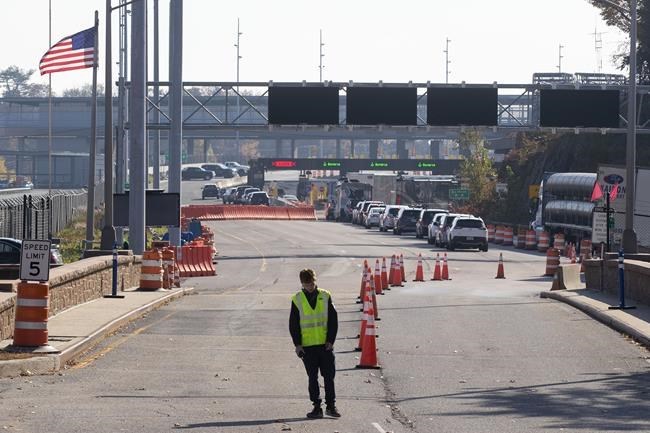BANFF, Alta. — The last of Canada's COVID-19 border restrictions are set to disappear at the end of this month, but some critics say they fear the measures have already caused a lasting decrease in cross-border travel.
At the Global Business Forum in Banff, Alta. on Friday, prominent voices who have been arguing for months in favour of the lifting of restrictions such as mandatory vaccinations, testing and quarantine requirements for international visitors said they’re now worried the economic impacts of such measures could be permanent.
In a panel discussion at what is an annual conference for business leaders in Canada's most-visited national park, Meredith Lilly - an associate professor at Carleton University and a former international trade advisor to Prime Minister Stephen Harper - said cross-border day trips by Canadians to the U.S. never fully recovered after the terrorist attacks of Sept. 11, 2001.
She said her research has showed part of that is due to the heightened U.S. border controls put in place after that event.
"Fewer Canadians travelled to the United States to shop or fill up their tank of gas because of the unfriendly border," Lilly said.
"Canada is now doing the same thing to Americans. So it’s going to take major effort to get Americans to come back."
Earlier this week, federal government sources confirmed the cabinet order maintaining COVID-19 border measures will not be renewed when it expires on Sept. 30.
The change means international travellers will no longer have to prove they are fully vaccinated against COVID-19. Under the current rule, Canadians returning to the country who aren't vaccinated must show a negative COVID-19 test result before arriving, and undergo further testing after arrival. They also must quarantine for 14 days.
The expiry also spells the end of insisting travellers use the ArriveCan app to input their vaccine status and test results, though the app will live on as an optional tool for customs and immigration.
But Lilly said the two-and-a-half years that pandemic-related border rules were in place was likely long enough to change the habits of some Americans, who will now no longer consider visiting Canada in the future.
Statistics Canada reported Friday that the number of international arrivals to this country increased in July even as they remain well below pre-pandemic levels.
The agency said the number of trips by U.S. residents in July was 2.2 million, 11 times the number of trips taken in July 2021, but still about 60 per cent of the trips reported in July 2019.
"So the picture still isn't great," Lilly said. "And three years is a long time for people to permanently change their behaviour."
Canadian Chamber of Commerce president and CEO Perrin Beatty, who also spoke in Banff Friday, said this country's tourism industry has now missed out on two summer seasons.
He said multiple medical experts have argued that testing asymptomatic travellers for COVID-19 at the border is far less effective than testing symptomatic Canadians within their communities.
"We’ve maintained these restrictions that simply make no sense. The cost to us, for small businesses in every part of this country, of the friction that we’ve put on at the border has been billions of dollars," Beatty said.
"And we’re out of step with other countries around the world, we’re out of step with the science, and we’re out of step with the rest of Canadian society because of these self-inflicted wounds we’ve put on ourselves."
A report released by the Canadian Travel and Tourism Roundtable on Friday aimed to assess the impact and effectiveness of border measures and other travel restrictions implemented by the federal government to slow the spread of COVID-19.
The report, which was authored by four Canadian doctors specializing in infectious diseases, emergency medicine and pandemic management, concluded border measures have been largely ineffective at preventing new COVID-19 variants from entering the country.
It also said there is no convincing evidence that pre-departure and on-arrival testing and surveillance have had a significant impact on local transmission in Canadian communities.
The expiry of the cabinet order on Sept. 30 doesn't deal with whether passengers must wear masks on domestic and international trains and planes because that rule is contained in a separate order issued by the minister of transport.
The tourism industry has argued masking on planes is also "inconsistent" from a policy perspective, given that the high air exchange rates on passenger aircraft make them one of the safest ways to travel from a COVID-19 perspective.
"But the government of Canada is saying the single most dangerous thing you can be doing is travelling by air," Beatty said.
This report by The Canadian Press was first published Sept. 23, 2022.
Amanda Stephenson, The Canadian Press




